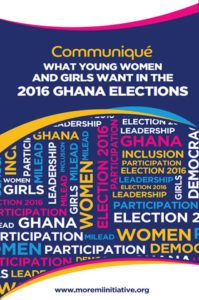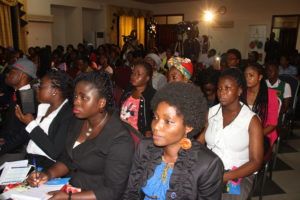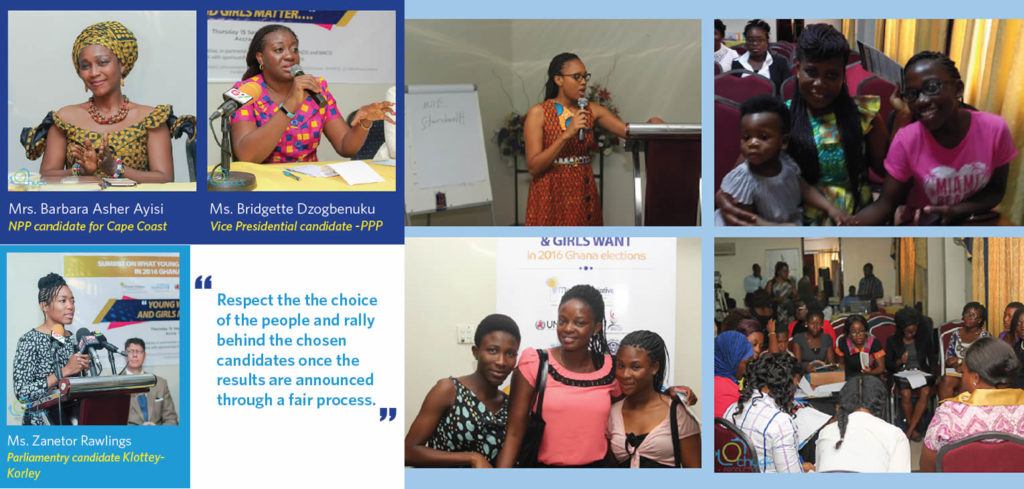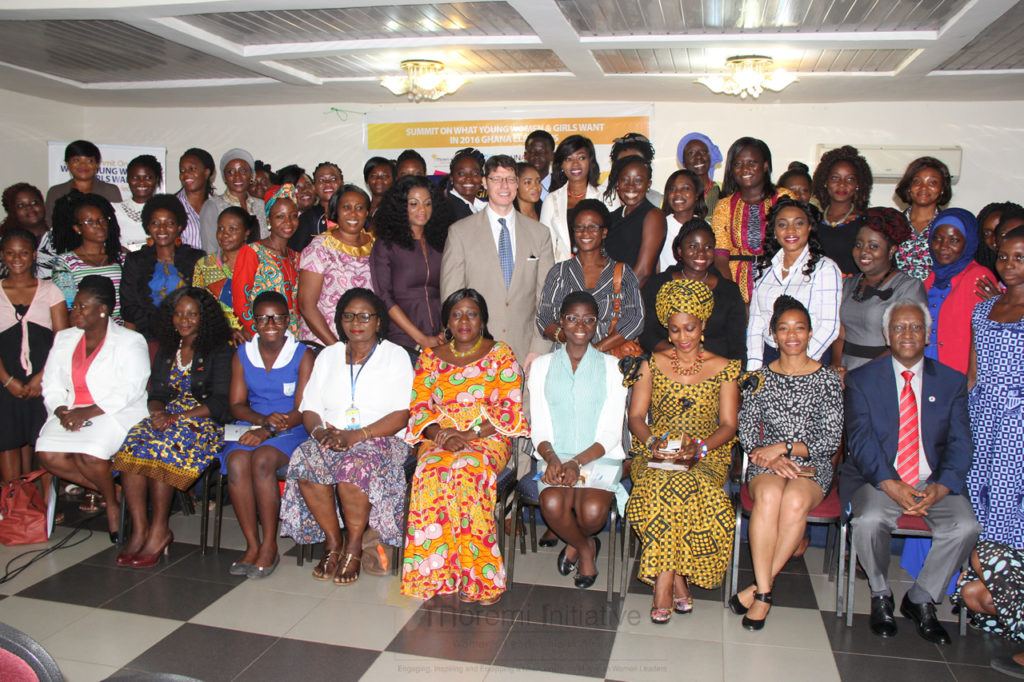Summit on What Young Women and Girls Want in 2016 Ghana Elections
Moremi Initiative, in partnership with UN Women, UNAIDS and WASCI, and with support from US Embassy-Accra, convened a historic dialogue on young women and girls’ participation in the 2016 Ghana Election. Recognizing the impact that a meaningful engagement with women and girls can have on the forthcoming elections, the over 100 young citizens representing all ten regions of Ghana and diverse socio-political backgrounds, hereby put forth these collective demands to the stakeholders of the Ghana 2016 Presidential and Parliamentary elections:
- We, over hundred young women and girls representing all ten regions of Ghana, of diverse socio-political and economic backgrounds, convened for the “Summit on What Young Women and Girls Want in the 2016 Ghana Elections” to raise our voices, issues and demands for the 2016 elections and beyond. The summit was convened by Moremi Initiative for Women’s Leadership in Africa, in partnership with UN Women, WACSI and UNAIDS and with funding from US Embassy-Accra.
- We, as young Ghanaian women and girls constitute a powerful demographic in Ghana today- in our numbers and in our collective potential. The choices we make will not only shape our own lives, but that of a whole new generation of Ghana and its future.
- We affirm our citizenship and all the rights of inclusion, participation, equality, respect and dignity guaranteed us by the Constitution of the Republic of Ghana, as human beings, as citizens, as young women and girls.
- We are extremely proud of our nation’s pioneering and leadership role as an imperfect but impressive rising example of democracy and peaceful elections on our great continent, and commit to do our part to ensure a peaceful, free and fair election this year.
- We, however recognize that in order to make our democracy more meaningful, the inclusion and full participation of women in decision-making and political processes at all levels is an indispensable requirement – for the truly democratic, peaceful and sustainable Ghana we aspire to.
- We decry the woeful under-representation of women in particular, in high political positions at both district and national levels, and the limited number of young female candidates in this year’s general elections.
- We stand in full solidarity with all our bold sisters who are among the few young women who made it as parliamentary candidates for their various parties and we wish them victory come December 7th 2016.
- We acknowledge the tremendous sacrifices, contributions and achievements of our mothers and sisters before us, and we promise to build on their efforts until our vision of an equal and just society is achieved.
- We reaffirm the principles and demands of important national gender equality efforts including the new Women’s Manifesto of Ghana, the Gender and Affirmative Action Policies of Ghana among others.
- We emphasise the importance of the 2016 elections and the opportunity it provides for girls and women to contribute to the agenda-setting and public policy formulation in Ghana.
We, on our part, commit ourselves to be agents for peace, tolerance and unity before, during and after the 2016 general elections.
Finally, we recognize the impact that a meaningful engagement with women and girls can have on the forthcoming elections, and hereby put forth these collective demands to the stakeholders of the Ghana 2016 Presidential and Parliamentary elections:
PRESIDENTIAL CANDIDATES
That all Presidential Candidates expressly make direct public statements to their followers to desist from sexist and unwarranted attacks on all women leaders who are currently playing important roles in the electoral process – from the Chairman of the Electoral Commission to the few but brave young female parliamentary candidates across the country; That each Presidential candidate take a public stand against intolerance, impunity, violence and injustice. That they openly commit to respect the voice and choice of the people after the December elections.
That they highlight issues of critical importance to women and girls as priorities in their campaign, debates and post-election agenda. We particularly want to hear candidates speak to and prioritize issues of increasing access to free quality education; violence against women; HIV/AIDS, reproductive health; entrepreneurship and jobs; ending child marriage; women’s access to land and productive assets; peace and budget allocation for gender equality initiatives.
That they read our Summit Recommendations on the key issues of importance to us and our future: from education and ending child marriage to agriculture and political participation of women in Ghana.
THE ELECTORAL COMMISSION
- Should re-affirm their commitment to organize free, fair, transparent and credible elections in which every Ghanaian citizen can freely exercise his or her voting right;
- Should provide aggregate data on the number of women voting at the various constituencies;
- Should involve all political parties and citizens in the campaign for peaceful elections to ensure that all understand and appreciate what is at stake;
- Should intensify its efforts to develop and strengthen systems and processes that can assure citizens and candidates of credible, transparent and fair elections.
THE POLICE & ALLIED LAW ENFORCEMENT
Must professionally discharge their duties in enforcing the law and maintaining law and order without fear or favour. Especially to commit to swiftly deal with political impunity and political violence targeted at female candidates as well as young women in general during and after the elections.
POLITICAL PARTIES
That, political parties in the allocation and distribution of campaign resources, make a deliberate effort to support female candidates and in particular, young female candidates.
Take deliberate steps to ensure women in general and young women in particular play more visible leadership roles in their parties and campaigns. Appoint more women into more visible campaign leadership at the national, constituency and grassroots levels.
Demonstrate their commitment to gender equality and respect for women and girls by openly discouraging sexist language, intimidation and political violence against women, and when it happens, take a strong public position against it.
Run peaceful and exemplary campaigns without use of foul language or actions towards opposing candidates and citizens, offer constructive criticism and discourage agitation of supporters.
Desist from forming, condoning or supporting vigilante groups and militant pressure groups, especially in the final days of the campaign season.
Respect the the choice of the people and rally behind the chosen candidates once the results are announced through a fair process.
Commit to ensure that all their elected executives undergo gender sensitization and diversity management training.
YOUNG FEMALE CANDIDATES
Stay focused, remain bold and know that we are cheering you on. Document your experiences and include young women.
Support each other.
Reach out and mentor other younger women and girls to be active citizens and not shy away from holding political or leadership office.
Above all, win.
DECLARATION
We hereby declare that the demands chronicled in this communique were made during the “Summit On What Young Women and Girls Want in the 2016 Ghana Elections” on 15th September 2016 in Accra by representatives of all young women and girls in Ghana.




